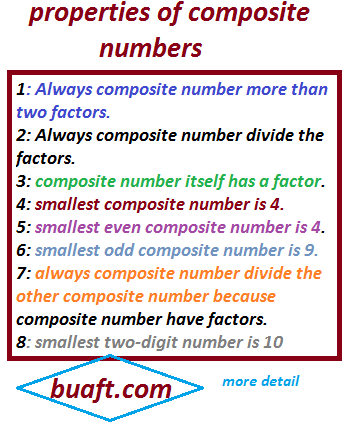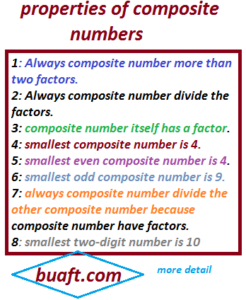In Math. The number which has more than two factor is called composite number. This numeric number is also called composite. Composite numbers are the opposite of primes number which have only two factors, that is 1 and number itself. All the Natural numbers, tho are not prime numbers, are composites number than they’s can be divided by more than two numbers. For example, 9 is a composite number because it is divisible by 1,3,9 and odd by 9. In this post, we shall learn the state of composites number, property, small composite numbers, even and odd composites number, table of composite numbers, and prime and composite number difference with many question and solution detail.
1:Statement
2:Example
3:Property
4:Table of composite numbers
5: composite number fined how
Composite Number divided into two part
(1) Odd
(2) Even
(i) Small Composite Number
(ii) Differences of Prime and Composite Numbers
(iii) Prime Factorization of composite number
Solve Examples
Composite Numbers in math ?
STATEMENT 1: In Math, a composite number is a number that has more than two factor.
STATEMENT 2: Any even numbers greater than 2 is an even composite number, it is always more than two factor.
EXAMPLE:
4, 6, 8,10…………..
STATEMENT 3 : Any odd number may or may not be a composite number.
EXAMPLE:
9, 15,21
9 is the first odd composite number;
FACTS:
1,3,5,7 have two factors these number can not be composite.
ZERO (0) IS A COMPOSITE NUMBER?
Zero is not a composite number.
Facts:
Zero has not any factor. Zero is zero
More example of composite number
composite numbers in table factor form
4,6,9,12,14,15,21 such that:
| composite even | composite odd | Factors |
| 4 | 1,2,4 | |
| 9 | 1,3,9 | |
| 6 | 1,2,3,6 | |
| 15 | 1,3,5,15 | |
| 12 | 1,2,3,4,6,12 | |
| 21 | 1,3,7,21 | |
| 14 | 1,2,7,14 |
what are the properties of Composite Numbers
1: Always composite number more than two factors.
2: Always composite number divide the factors.
3: composite number itself has a factor.
4: smallest composite number is 4.
5: smallest even composite number is 4.
6: smallest odd composite number is 9.
7: always composite number divide the other composite number because composite number have factors.
8: smallest two-digit number is 10
We find the odd composite number by division:
we have a number 21
- 21÷1=21
- 21÷3=7
- 21÷7=3
- 21÷21=1
we see that the number of factor of 21 is 1,3,7,21, so this is an odd composite number
Now we find the even composite number by division:
we have a number 21
- 8÷1=8
- 8÷2=4
- 8÷4=2
- 8÷8=1
we see that the number of factor of 8 is 1,2,4,8, so this is an even composite number
prime numbers ?
A number which has only two factors is called a prime number. One is not a prime number because it has only one factor.
Now we check prime number by division.
P/q ∈ q and q ≠0 this is mathematically in set theory.
Example:
2, 3,5, 7 are prime number, we check these by division method.
| Prime number | Factors | factor quantity |
| 2 | 2÷1=2
2÷2=1 |
1,2=2 factors |
| 3 | 3÷1=3
3 ÷3=1 |
1,3=2 factors |
| 5 | 5÷1=5
5÷5=1 |
1,5 = 2 factors |
| 7 | 7÷1=7
7 ÷7=1 |
1,7= 2 factor |
Important note: on first ten numbers
|
RELATED POST:
ascending and descending order number
identity matrix multiply diagonal
3.14159 is rational or irrational
finite and infinite set ppt test
Straight Line parallel to the x-axis equation

